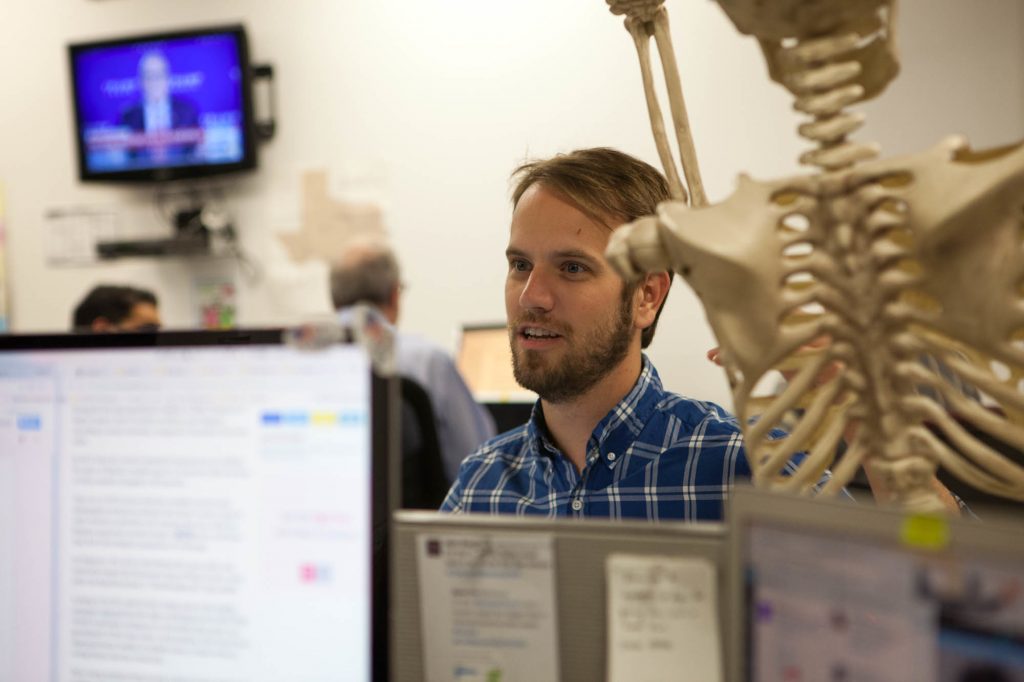From The Battalion to the Texas Tribune
One Aggie student uses his liberal arts degree to his advantage as a journalist.

By Kira Schwarz ‘22

Matthew Watkins moderates the “Good Sports” panel with guests John D. Steinmetz, Chris Del Conte, Renu Khator and Ross Bjork at The Texas Tribune Festival Sept. 27, 2019.
Before enrolling at Texas A&M University, native Austinite Matthew Watkins was confident about his future. Business seemed to be the rational option for Watkins’ studies, and his father’s occupation as a banker made it look all the more enticing. Fast-forward two decades later, and Watkins is now the managing editor for news and politics at The Texas Tribune, one of the most esteemed publications in its eponymous state. Watkins decidedly wanted a more holistic education, and said he felt a liberal arts degree would best encompass this interest.
Briefly considering a career in the news before coming to Texas A&M, Watkins ran out of luck when the university removed its journalism program in 2003, the summer before his freshman year. He remained open-minded about the potential career opportunities he could pursue with his B.S. in political science.
“I remember watching a documentary during my freshman year in college about media coverage of the war in Iraq and how it was presented to the public,” Watkins recalled. “It made the argument that the media coverage was a little bit skewed in favor of the American military. I wasn’t sure I completely agreed with everything in the documentary, and I remember being a little bit frustrated, thinking, ‘I wish I could have just seen this for myself and drawn my own conclusions.’ That really triggered a feeling in me, that urge to see things for myself, draw my own conclusions, and report what I’m seeing in a way that can help educate other people about what’s going on in their world.”
Someone advised Matthew that the best way for him to become a journalist was through experience, and the best way to gain it was through his student newspaper. Applying for The Battalion and working as a reporter, Matthew came to love the process of interviewing, writing, and publishing stories with his colleagues. Following graduation, Watkins worked at The Eagle in Bryan, Texas. He started out doing “night cops” shifts.
“I would come in at 1:30 in the afternoon and work until 10:00 at night three times a week,” Watkins explained. “Any crime or police related stories that would happen during that time, I would write a story about it.”

Priced Out
Matthew Watkins moderated the “Priced Out“ panel with speakers Gerald Cichon, Sarah Eckhardt, Rodney Ellis, Eddie Bernice Johnson, and Rey Saldaña at The Texas Tribune Festival on Sept. 29, 2018.
In addition to police work, Watkins also covered criminal and civil trials, as well as city hall meetings in Bryan and College Station. With a constant influx of stories at The Eagle and the guidance of The Eagle’s managing editor at the time, Kelly Brown, Watkins was able to sharpen his journalistic craft during the years he worked there. In contrast to the smaller staff of The Eagle, Watkins’ next role at The Dallas Morning News allowed even more resources to pursue his reporting, at times including out of state travel to cover waging court battles or unearth public documents.
In 2015, The Texas Tribune in Austin reached out to Watkins to take an open position at their publication. The opportunity was long-awaited. Since his childhood, he had always admired Evan Smith, the editor of his favorite magazine, Texas Monthly. When Smith left Texas Monthly to start The Texas Tribune in 2010, Watkins’ respect for the journalist grew even more. At the time, cutbacks to Texas government news coverage were being made to publications across the state in light of the economic recession.
“It was not a good thing for the state, and it was not a good thing for democracy,” Watkins said. “The state government, the legislature, the governor — their actions really impact lives in a very significant and deep way, and Texans need to understand what’s going on there and what’s being done in their name. Losing those journalists was making it a lot harder.”
While working for The Eagle, Watkins reached out to Smith and Ross Ramsey, a long-time Austin journalist, to express his esteem for them and to ask for a position at The Texas Tribune. Although he was turned down at first, Watkins’ deep appreciation for their work kept the three of them in touch. Five years later, Watkins found himself accepting the role of a reporter at the Tribune. Watkins is passionate about journalism serving the interest of the public, and sees it as an essential cog to democracy.
“At the Tribune, this is what the founding was, and this is what we still try to do now,” Watkins explained. “We really try our hardest to dig deep into how government, particularly state government, is affecting the lives of Texans — the good and the bad. That’s basically what we do everyday. We’re really kind of laser focused on that mission, of informing and engaging Texans with their government so they can play their role responsibly in democracy.”

Matthew Watkins’ desk at The Texas Tribune holds papers, pictures of his children, and his colleague.
When reflecting on how his liberal arts education influenced his career, Watkins says that a communication course he took called “Journalism As A Profession” put him in the direction of where he is now. Additionally, the political science classes he took familiarized him with how the American political system functions.
“In order to be a responsible, accurate, and fair journalist, it’s really important to be engaged intellectually with the world, to be able to think critically, to try to know about a lot of topics and to be well read,” Watkins said. “In a lot of the classes I took as a liberal arts major, that’s one of the big goals of the liberal arts program, is to expose you to those things and teach you to be a critical thinker. I think that is hugely important, and one of those things that you need before you get into the newsroom. I can teach someone and help edit their story, but I can’t force them to be interested in certain topics, or engaged with the world around them.”
